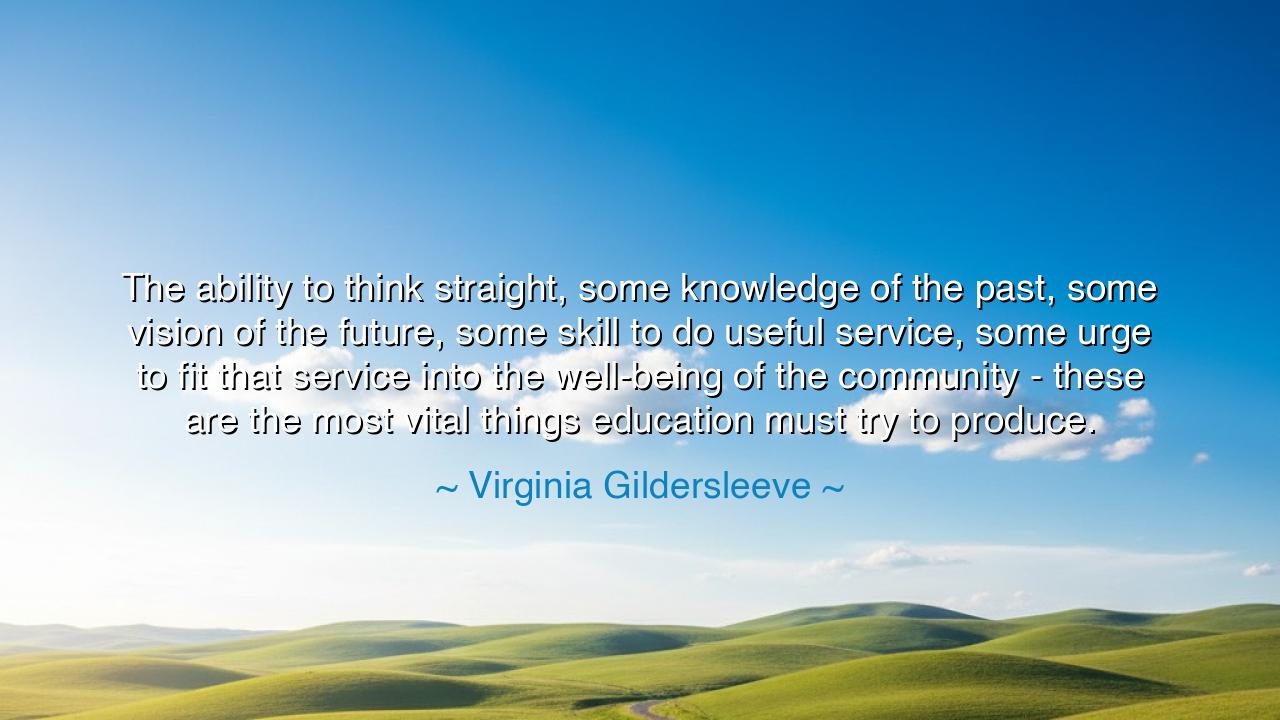
The ability to think straight, some knowledge of the past, some
The ability to think straight, some knowledge of the past, some vision of the future, some skill to do useful service, some urge to fit that service into the well-being of the community - these are the most vital things education must try to produce.






“The ability to think straight, some knowledge of the past, some vision of the future, some skill to do useful service, some urge to fit that service into the well-being of the community — these are the most vital things education must try to produce.” So spoke Virginia Gildersleeve, a scholar, reformer, and the long-reigning dean of Barnard College, whose wisdom shines like a lantern through the fog of modern learning. Her words, though shaped in the halls of academia, speak to something eternal: that education is not the stuffing of the mind with facts, but the shaping of the soul for purpose. It is not a collection of certificates, but a preparation for service, for vision, and for community.
In Gildersleeve’s age — the early 20th century — the world trembled between two wars, and the promise of civilization stood at risk. She had seen what happens when education becomes clever but not wise, technical but not moral. Her cry was not for more scholars, but for more citizens — for men and women whose minds could think straight, whose hearts could remember the past, whose spirits could see beyond the horizon, and whose hands could labor not for self alone, but for the good of all. For to her, true education was not a luxury of the privileged; it was the foundation of civilization itself.
Let us begin with her first commandment: the ability to think straight. This is no small thing. To think straight is to see truth without distortion, to weigh emotion against reason, to stand unmoved by the clamor of the crowd. In every age, humanity has been imperiled not by ignorance alone, but by confusion — by those who mistake noise for wisdom and prejudice for principle. The straight-thinking mind is the mind that seeks clarity over comfort, honesty over vanity. It is the mind of the scientist who questions, of the judge who listens, of the citizen who dares to ask, “Is this just?” Without such minds, freedom becomes fragile and truth becomes a rumor.
Next she calls for some knowledge of the past — for how can a people walk forward if they do not know the road behind them? The past, though imperfect, is our teacher. It holds the record of triumph and folly, of beauty and cruelty, of the eternal struggle between light and darkness within the human heart. The one who knows history walks with the wisdom of many lives; the one who ignores it repeats their mistakes in new and tragic forms. Gildersleeve’s warning is gentle but grave: a generation unmoored from memory will drift into the sea of folly, thinking itself new while sinking into old errors.
Yet she does not leave us facing backward. She adds also the call for some vision of the future — the dreamer’s gift, the prophet’s duty. For education that does not kindle imagination breeds mediocrity. The truly learned must not only remember what has been but imagine what might be. Vision is the flame that lights the path of progress, that urges humanity to build fairer cities, to write nobler laws, to love more deeply than before. Without it, knowledge becomes dust — dry, clever, and lifeless.
But Gildersleeve’s wisdom is not confined to the mind’s realm. She speaks, too, of skill — the ability to do useful service. The educated person, she reminds us, must not only think well, but do well. Thought alone cannot till the field, heal the sick, teach the child, or mend the world. Knowledge becomes true when it is made action — when hands and heart labor together. Thus she calls for not just scholars, but servants of humanity — those who wield their gifts to strengthen the common good.
And finally, she gives her deepest truth: the urge to fit that service into the well-being of the community. For education, if it serves only the self, becomes corruption disguised as learning. The mind that seeks only personal gain is a candle turned inward — it burns, but gives no light. Yet when one’s learning is offered in love, in the service of others, it becomes a beacon for the world. The community — that sacred web of shared life — thrives only when each member sees their strength as part of a larger harmony. Gildersleeve’s vision is not of isolated brilliance, but of unity through service, of wisdom joined with compassion.
So, dear listener, let her words become your compass. Seek education not merely to rise above others, but to lift others with you. Learn to think clearly, to remember deeply, to imagine boldly, to work skillfully, and to serve selflessly. For these, as Gildersleeve knew, are the pillars of a civilization that endures. The true measure of learning is not how much we know, but how well we live, how much we give, and how faithfully we weave our knowledge into the tapestry of the human family.
In the end, the highest calling of education is this: to make us not only clever minds, but good souls — men and women who see truth, cherish history, build the future, labor with purpose, and live for one another. That is the wisdom of Virginia Gildersleeve — and it remains as vital now as when she first spoke it, a torch to light the path for every generation that follows.






AAdministratorAdministrator
Welcome, honored guests. Please leave a comment, we will respond soon